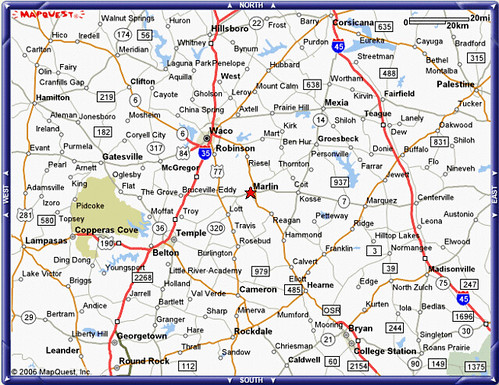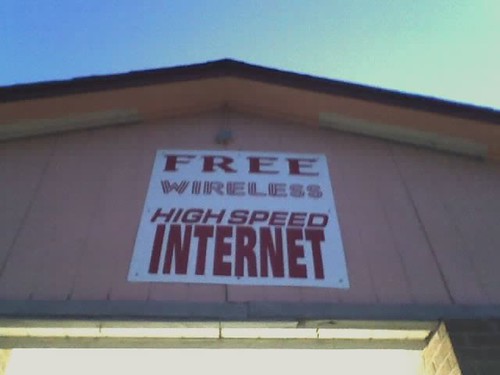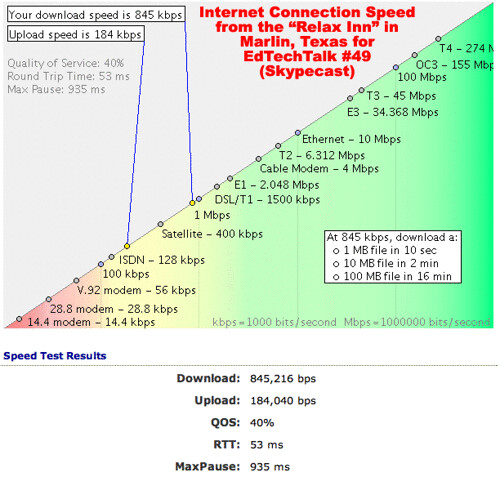I was honored to be included in EdTechTalk #49 last night with Miguel Guhlin and hosts Jeff and Dave. I also consider myself very lucky to have been able to connect via skype for this dialog at all! I was driving from Lubbock, Texas down to Bryan / College Station, Texas (about an 8 hour drive) and left later than I’d hoped. As a result, at the start time for the conference we were south of Waco in a small town named Marlin. A mp3 of the session is available (26.6MB – 58 min, 15 sec.)
To my great delight, the “Relax Inn” in Marlin (on highway 6) had free wireless Internet access, and the speed proved to be more than adequate for an almost 2 hour skype connection to Worldbridges for EdTechTalk.
Thankfully, there must not have been many or any other Internet users at the motel during that time, because the skype connection quality was really good the entire time. The only technical problem I had late in the conversation was not being able to unmute my microphone for some reason– but this was resolved by disconnecting and reconnecting to the skype conference.
It was amazing to have so many people from different places around the globe listening in live, interacting in the chat room, and getting patched in to directly ask questions. Having a free Internet-based phone conference with people around the globe from Marlin, Texas, was a remarkable experience for me to say the least. But the technology is not what was most compelling and noteworthy in my mind– it was great to visit with Miguel and others about digital social networking, DOPA, technology integration challenges, and desirable agendas for educational reform. I enjoyed the fact that the conversation moved toward the end more toward politics and possible agendas for change. As I hope I conveyed, I am convinced the solutions we need most are local ones, that are from grassroots based. I am more a dynamist than a technocrat. I believe we can and do make a difference every day in the decisions we make: what we need to do more is get together and work together. We want elected officials to understand and support our agenda, but the solutions we need to work for are not at their core top-down proposals. That is what we seem conditioned to look for and ask for, but those aren’t going to produce the real changes we’re looking for.
I have briefly scanned the chatroom transcript, and see lots of dialog I missed– I didn’t see John or Cheryl’s congrats on the new job– so I wasn’t ignoring that guys– it was interesting having so much going on… keeping track of the audio conversation, looking at the text chat, etc. Very engaging but also attention challenging!
This reminds me of some very early experiences I had in a graduate class in 95 or 96 with a “MOO” – a text-based chat environment. Can be hard to follow at times, but still very powerful. Tapped In is an online, text-based environment that has thousands of educator members and is still active– I don’t think it has any audio options, but is still a real effective environment for interaction and shared learning. Jeff Cooper has been working on getting me to learn about Tapped In, and I am going to do this when things slow down a bit… I just loved the audio/voice connection, however. The keyboard can be a big impediment to communication and sharing… I think somehow the microphone is potentially more empowering. As Miguel has noted, writing has comparative benefits to talking– more time to reflect, time to revise prose, etc. Both are powerful and good to use. My latest article for the TechEdge focuses on “interactive podcasting” technologies for asynchronous audio dialogs, and I think these are exciting additions to the web 2.0 environment. I wonder if we’ll see course management solutions like Moodle integrate these as plugin options?
The unfortunate phenomenon of high-stakes testing seems to be a global phenomenon. In the chat, Brad Hicks talked about the standards movement gaining traction in Australia, and several other US educators echoed perceptions that high-stakes testing is all the rage in their locales. It is extremely valuable to have opportunities like this to exchange ideas and perceptions with other teachers literally around the planet. This makes me want to join an upcoming class of the Webheads, if that is possible!
John Blake made an interesting comment in the chat room that I missed, but I would like to reflect on now:
In my school, each kid has a computer, and we can not pay them to attend school regularly
One of my professors, in relation to technology immersion projects, wondered if we couldn’t get better student attendance by literally paying students to show up for class? Take the amount of money paid per year for the laptops and all the teacher training, divide it by the number of school days, and then pay students that amount each day they come to school. This was a bit of a tongue-in-cheek suggestion, but also a serious one… I doubt we’d ever see an experimental group like that in a scientifically designed / quasi-scientifically designed educational study on technology immersion, but it is certainly an interesting idea. And it just might work! Money is a motivator. The biggest challenge in 1:1 is the teacher component I think– kids pose challenges too, but I think the challenges they pose are easier to deal with than teachers who don’t want to change and learn to teach in new ways with technology. That was the gist of John’s question to me in the skype conference, as I recall.
Brad had a good question relating to student engagement in the chatroom as well that I missed, asking:
How to better engage students?
I think the following formula which I shared during these sessions is instructive to this answer: Engagement = Interactivity + Meaning. The key ingredient, that is most difficult, is having teachers strive to make educational experiences meaningful. There is so much pressure to cover the curriculum and teach to the test, that I think many teachers consider the idea of trying to make learning truly meaningful, student-centered, and matched with student interests and schema (at least to a greater degree than it often is now) just a pipe dream.
In relation to distance learning, Jason Robert Shaw asked in the chatroom:
Will we lose the brick and mortar?
In the context of higher education, I think that answer is a resounding “no!” At the institution where I have worked for the past five years, there are definitely some faculty, administrators, and staff members that are very serious about distance learning and striving to do it with ever-increasing levels of quality. However, my perception (admittedly limited) is that the majority of college professors remain extremely traditional in their pedagogical approaches and generally regard distance learning, blended learning, and instructional technology in general as an undesirable threat. Maybe I’ve just hung around folks that are neo-luddites (though they may not claim that label themselves)– but that is my perception. It is a VERY slow and personalized process to help move faculty into a place where they are embracing new technologies within their instruction, taking risks, etc. It’s just so much easier to remain traditional and comfortable. And the existing university tenure system does not reward (at least in my perception) risk-taking and technology immersed teaching for newcomers. So there are a lot of challenges, and I don’t think we are going to see public universities at least– broadly embrace distance learning and move away from bricks and mortar-based education.
Miguel shared one of his favorite quotes in the chatroom worth repeating here:
He who believes does not flee.
Of course with my new job, I am wondering if he is talking to me? Although I am going to work for a corporation, I do not see myself as “selling out to the man” with this decision… My heart and passion remains the same, as far as teaching and learning goes… so we’ll see how that fits into the mold I am moving into. My perception is that it’s a relatively flexible mold, which will be a good thing…
I did not realize until reading the chat transcript that Buthaina is from Kuwait! Whoa– they don’t call it Worldbridges without reason! 🙂
This was a funny post from John Blake in the chatroom:
Brad if you asked all the teachers in our district what a Blog is, they would prbly say something you eat on a picnic!
Probably right in many schools. Here in Bryan ISD at least, after Wednesday they’ll be about 100 more teachers who know about blogs and may start using them! We have to work toward improvement one conversation at a time…..
Matt shared a great quotation from Margaret Mead that is the sort of thing we all need to hear in these discussions about educational change and reform:
A small group of thoughtful people could change the world. Indeed, it’s the only thing that ever has.
That is spot on! We ARE changing the world. The fact you are reading this blog is an amazing feat. I am literally just sitting in my hotel room in College Station, Texas, and people around the world are reading these ideas. We are changed by the things we read, the images we see, the conversations we listen to and participate in. We are the change. This reminds me of one of my slides from today’s workshop:
Embrace the change. Be the change.
I am really excited at the prospects of starting my work for AT&T as an education advocate. The current discussions about “net neutrality” may put me in an interesting place relative to my blog– I still need to do a lot more reading and listening about this issue– but I hope there will be lots of opportunities to share these messages with even more teachers in Oklahoma and elsewhere as a result of my employment.
It would perhaps be cheesy to say “we are the world,” but that thought does occur to me in this context. I shared my blog clustrmap with the teachers today several times– it is a powerful visual of the global conversations we are continuing to have in the edublogosphere and the web 2.0 powered information environment. Here’s another jingle that comes to mind, perhaps silly, but none-the-less appropriate:
I am the change. You are the change. We are the change together. All in the edublogosophere, all around the world… yes, we’re the change together!
Those uncomfortable with the evangelist metaphor for edtech integration may not like or appreciate this– but there are some valid parallels to evangelism here.
Enough said I think! Great conversation, and great text chat that I missed in realtime, but caught up with (at least part of) thanks to asynchronous technologies. Viva la revolucion!
If you enjoyed this post and found it useful, subscribe to Wes’ free newsletter. Check out Wes’ video tutorial library, “Playing with Media.” Information about more ways to learn with Dr. Wesley Fryer are available on wesfryer.com/after.
On this day..
- Learning about Digital Videography from Jim Sill – 2014
- Amazing Perspective in GoPro Videos – 2014
- Feedback Wanted: ISTE13 Ignite – Open Doors for Students – 2013
- Create a Narrated Slideshow on an iPad with Haiku Deck and Explain Everything – 2013
- Kevin Hodgson is the YODA of Stopmotion in the classroom – 2010
- Electrical outlets in demand – 2010
- Natural Learning: What Schools Don’t Do by Steve Wycoff – 2008
- Online Safety: What every educator should know (Kevin Honeycutt) – 2008
- Drupal for Education by John Jones – 2008
- LoTi: Elevating Expectations, Performance and Accountability – 2008




Comments
One response to “EdTechTalk podcast with Miguel, Jeff and Dave”
hello from another Webheads teacher and virtual nomad who would often also be present on Worldbridges webcasts. I like your lively description of this session a few weeks ago! You certainly had great luck with finding a good wifi connection. Hope to meet you some day soon by Worldbridges.
yours, Sus in Denmark